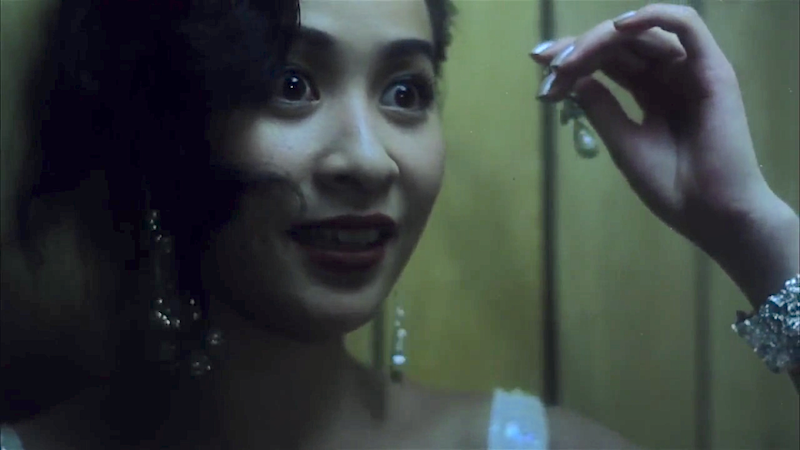by Nick Taylor

Happy Birthday, Wong Kar-Wai, who turned 62 years old last week, something that surely feels impossible for anyone younger than 61 to really consider for themselves! The celebrated auteur is known for his indefatigable sense of coolness and poise, doing for delicately conjured yet passionately felt romanticism what Ingmar Bergman did for psychological anguish. Especially in certified masterpieces like In the Mood for Love and Happy Together but even in lesser works like My Blueberry Nights, Wong’s sense of style is refreshing to sit with and inimitably his. And so, in celebration of our beloved birthday boy and the many gifts he’s given us across his career, I’m here to discuss Days of Being Wild, and the bewitching, jewel-toned performance of Carina Lau...
The main character of Days is an unemployed Hong Kong playboy named Yuddy (Leslie Cheung), who continuously goes through the same cycle of seducing and abandoning any number of women in his life. We get a quick example of this routine in the film’s opening ten minutes, as Yuddy worms his way into the life of Li-Zhen (Maggie Cheung), an employee at a very lonely shop that Yuddy frequents. She goes from reluctantly pawing off his advances to spending a couple hours a week in his bed, only to be kicked out when she asks if he’d ever want to get married. Soon after Yuddy gets involved with a cabaret dancer going by the name Mimi (Carina Lau).

Days of Being Wild is a fully enticing experience in its own right but is even more exciting as early evidence of Wong’s gifts with narrative and form. The eventually familiar elements are all there -- self-sabotaged, unfulfilled romances, a winding, elliptical structure, Christopher Doyle’s fluorescent lensing and cool blue color palette; they're already fascinating, and it's gratifying to watch knowing what the next ten years have in store for this crew. Still, everything that makes Days of Being Wild such a great harbinger for Wong’s future also points to what’s unrefined or truncated about it in this early stage of his career.
Lau’s performance is the most fully formed element of Days, connecting with her material and enlivening it to a degree none of her costars quite manage. She slips into the film almost offhandedly, as a blank-faced, silent bystander to Yuddy's violent encounter with a male prostitute. But they end up on an impromptu date and Mimi spends the evening asking questions about Yuddy’s life while deliberating how much she wants to be there.
The unexpectedly quick dismissal of Li-Zhen in the prologue adds a certain tension to this scene beyond the question of “will they or won’t they?”. If we understand Yuddy as someone who easily discards women, how long can we expect them to be together? Will we even see Mimi again after this scene? Watching Mimi and Yuddy’s night unfold is the best sequence in the film, gracefully evolving across different emotional pitches (sometimes extremely different ones) while remaining a coherent, exquisitely filmed experience. Lau is instrumental to the success of this scene, her pronounced shifts in feeling contrasting with Cheung’s laconic exterior. They generate a heated, in-the-moment chemistry with each other that still leaves room for visible gray areas and decidedly unromantic faultlines.

As their relationship continues, and Days adds and discards narrative threads, it’s increasingly clear how Lau, more than Cheung or Doyle or Wong, is the primary engine driving her scenes. Lau is able to create a stable characterization by playing into Mimi’s sometimes mercurial shifts in emotion rather than sanding them down. She’s also the only actor who takes the step of physically externalizing what Mimi is thinking and feeling at any given moment, forever finding postures that are equally plausible for both Wong’s intoxicatingly stylized reality and how a normal person might move through the world. Her performance goes the farthest towards realizing a crystalline art object but also a living, breathing person trying to enjoy a relationship where she’s clearly more devoted to her partner than he is to her. Where the opacity and gaps in the other emotional entanglements can feel somewhat empty, Lau makes whatever questions we have about Mimi feel like real mysteries to be further considered.
Lau endows her later scenes of heartbreak with real, jagged edges, tearing away at her film's composure and glossiness without breaking away from it. When Yuddy finally dumps Mimi, it stings all the more because she appeared to be bridging a new level of intimacy with him, only for him to literally slam a door in her face. Her pain is deeply felt and unexpectedly poignant, despite or even because the viewer already knew he'd leave her eventually.

Mimi forgoes niceties or dignity in the first of the post-breakup encounters, throwing a tantrum in a near-empty building and rendered stupefied by the indifference of her target. But she's also capable of sticking up for herself and of quietly shrinking into herself with disappointment. Lau's openly wounded sorrow is prescient of the sharper, bloodier duels between Leslie Cheung and Tony Leung in Happy Together, yet she achieves this minus a costar to match her energy or a director expressly interested in fostering that intensity elsewhere. All the while she's as beautiful and poised as Maggie Cheung would be later in In the Mood for Love. Other actors have been just as memorable in similar ways in future Wong films, but Lau is such a riveting presence that her choices feel entirely singular to her. She imbues Days with a wellspring of emotion while staying perfectly attuned to its gorgeous, woozy way of being wild.